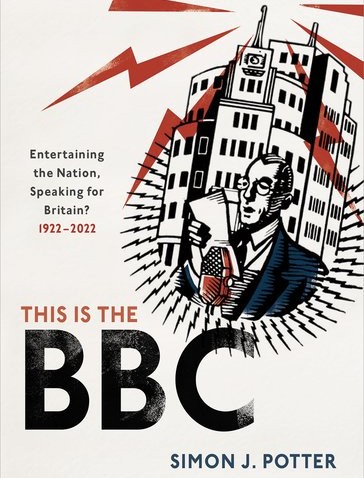Simon Potter, Professor of Modern History at the University of Bristol and author of several books about the British Broadcasting Corporation, is set to reflect on how the organisation has changed over the last century and consider its future prospects during the evening event on Tuesday, 18 October in the Wills Memorial Building, in Queens Road.
Professor Potter said: “Like The Doctor from Doctor Who, the BBC has gone through multiple incarnations, meeting seemingly mortal threats from new and familiar enemies. Despite these ongoing battles, it also remains perhaps the most important and admired public face of Britain around the world. The lecture is an opportunity to look back at this rich history as well as consider what lies ahead for the corporation.”
The free lecture, entitled The BBC at 100 – the end of an era?, will look at its landmark achievements in the face of growing pressures, including threats to funding, hostile politicians, claims of bias and complaints about programmes. As new media platforms emerge and global streaming giants expand, the BBC is experiencing unprecedented competition as it strives to stay relevant and retain its audiences.
Now a global operation, the BBC started off only with a few small radio stations around the country. Bristol was without its own radio station for some time. In the early days of broadcasting, the Cardiff station was the closest to the city, and even that was not accessible to many households in Bristol. The difficulties continued when broadcasting was reorganised on a regional basis in the 1930s.
Professor Potter said: “Bristol was made part of the 'West' region that included both the South West of England and South Wales, broadcasting from Washford in Somerset – in the building that now houses the Tropiquaria Zoo. This merging of English and Welsh audiences prompted complaints from listeners on both sides of the Bristol Channel, and the region eventually had to be split up in 1937.”
Twelve years after the BBC's founding, the BBC’s Bristol studios on Whiteladies Road were opened to make programmes for the West Region and the BBC national network, in 1934. During the early stages of the Second World War, Bristol hosted a huge amount of the BBC's programme production operations.
Professor Potter said: “Hundreds of BBC staff were evacuated from London to Bristol in anticipation of the Blitz. Later, as the bombers reached Bristol, some of the BBC's operations were moved into the tunnels of the Clifton Rocks Railway and its clear Bristol has since played a key role as a centre of BBC radio and television production, for example with its world-renowned wildlife and natural history programmes.”
Coinciding with the centenary, this year also saw the publication of Professor Potter’s latest book on the Corporation called This is The BBC – Entertaining the Nation, Speaking for Britain? 1922-2022.
Professor Potter said: “As it celebrates its centenary the BBC can be proud of many achievements, but we also need to recognise and analyse its various failings. At a time when some are calling for an end to the TV licence fee and for profound changes to the structure of British broadcasting, this is an opportunity to consider how the BBC has evolved over its first century and recognise that the BBC has constantly been obliged to adapt to its changing environment.
“Amidst a period of considerable transition and turmoil, the stage certainly seems set for a further transformation of its identity and structure, hopefully for the public good.”
The event starts at 6pm and bookings can be made online.
